The HP S700 And S700 Pro SSD Review
by Billy Tallis on September 7, 2017 9:00 AM ESTMixed Random Performance
Our test of mixed random reads and writes covers mixes varying from pure reads to pure writes at 10% increments. Each mix is tested for up to 1 minute or 32GB of data transferred. The test is conducted with a queue depth of 4, and is limited to a 64GB span of the drive. In between each mix, the drive is given idle time of up to one minute so that the overall duty cycle is 50%.
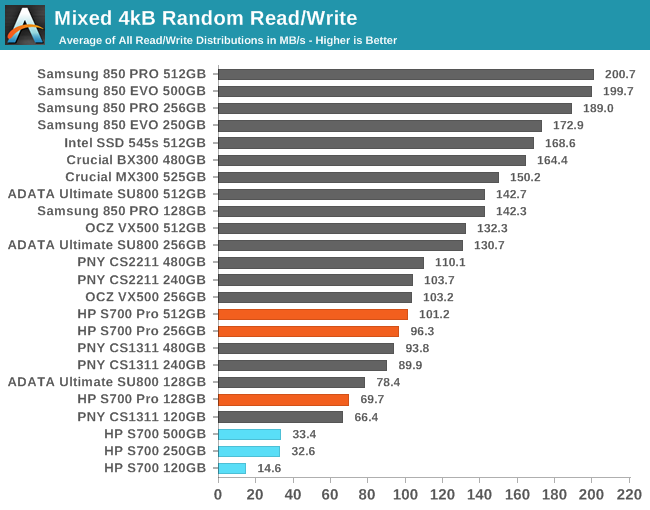
The mixed random I/O performance of the larger S700 Pros is below average, and also slower than the ADATA SU800 in specific. The S700s are the slowest of all, with the larger two offering half the performance of the slowest SSD with DRAM, and the 120GB S700 being less than half as fast as its larger siblings.
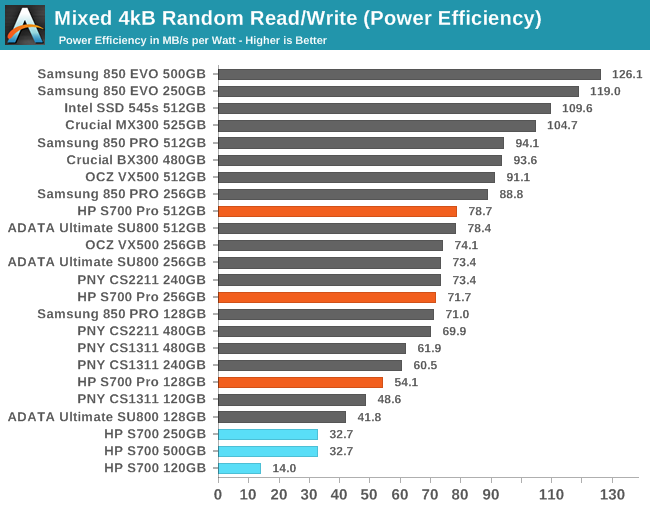
The power efficiency scores of the HP S700 aren't quite as bad as the performance scores, but it's still at the bottom of the chart and clearly worse than any SSD with DRAM. The S700 Pro is pretty efficient for a TLC-based drive, but is beat by the Crucial MX300 and Samsung 850 EVO.
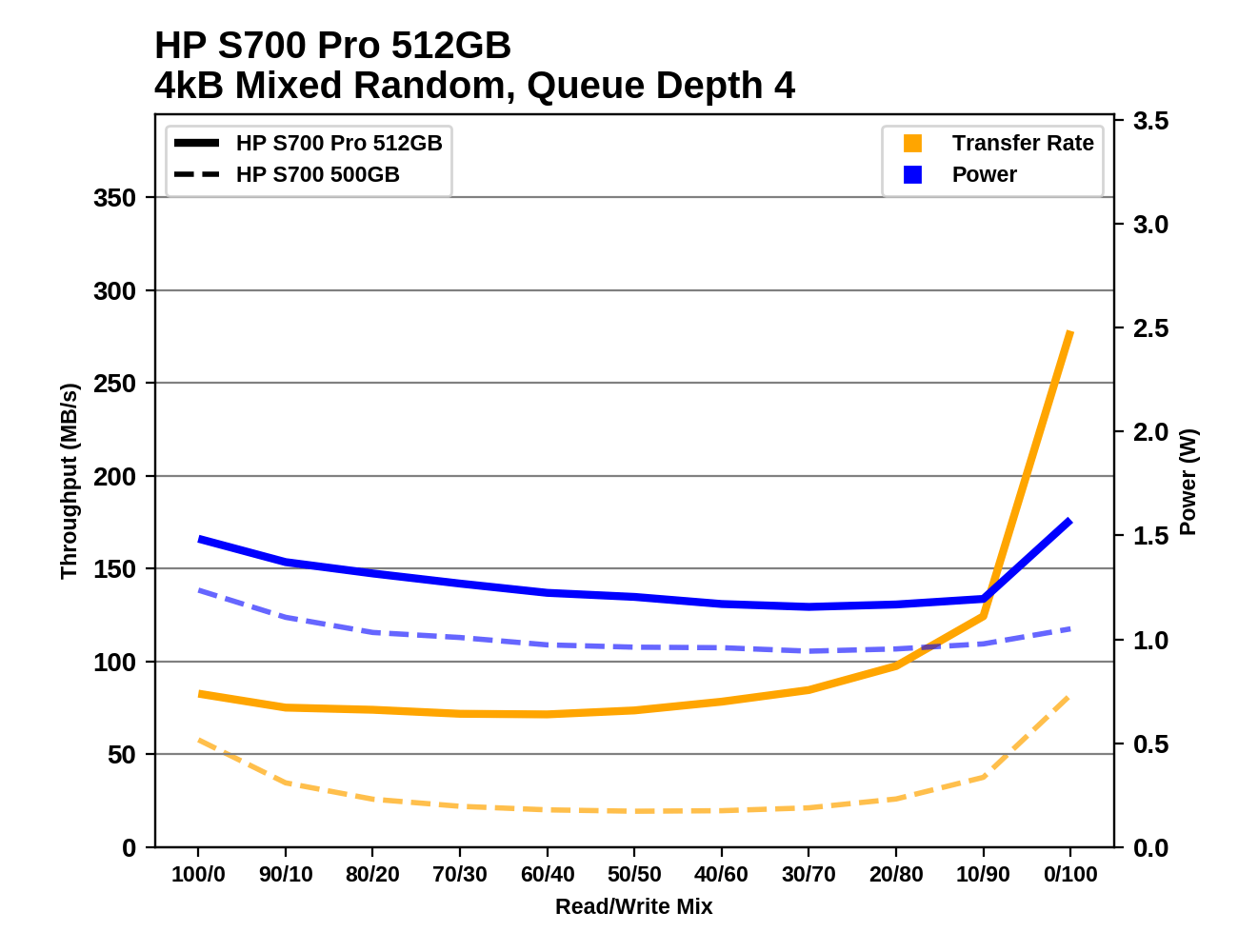 |
|||||||||
The performance of the S700 Pro only drops a little bit during the early phases of the mixed random I/O test, then rebounds gradually before spiking at the very end when every operation is a cacheable write. The 128GB S700 Pro runs out of SLC write cache space before the test is over and doesn't show the same peak in performance (though the spike in power consumption reveals the background work happening). The S700s start out slow, lose proportionally more of their performance in the early phases of the test, and only experience a small peak in performance at the end when every operation is a write.
Mixed Sequential Performance
Our test of mixed sequential reads and writes differs from the mixed random I/O test by performing 128kB sequential accesses rather than 4kB accesses at random locations, and the sequential test is conducted at queue depth 1. The range of mixes tested is the same, and the timing and limits on data transfers are also the same as above.
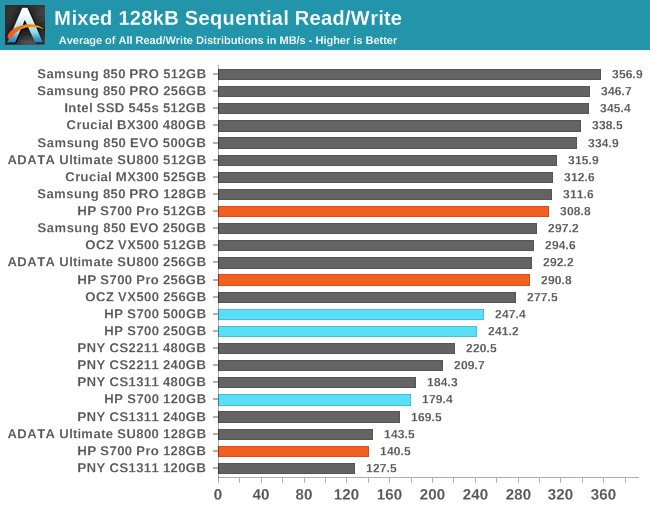
The mixed sequential I/O performance of the larger two HP S700 Pros is decent, and thanks to their great read speed the S700 isn't too far behind. The 120GB S700 scores significantly higher than the 128GB S700 Pro.
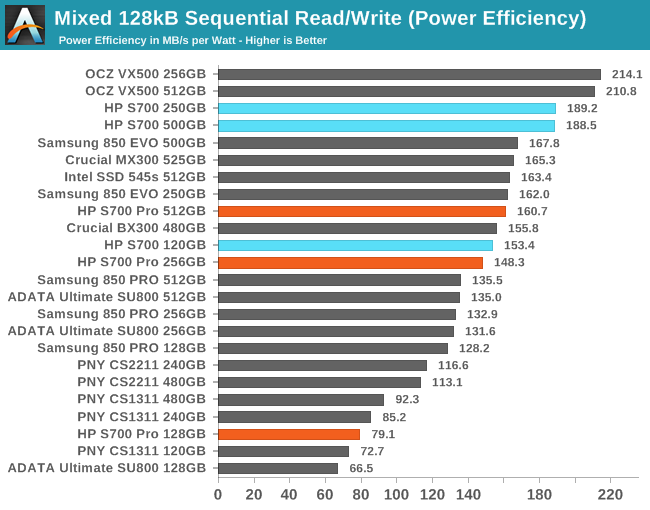
The power efficiency of the larger two S700s is great, but not quite up to the level of the OCZ VX500. The smallest S700 and the larger two S700 Pros are a bit above average in efficiency. The 128GB S700 Pro is near the bottom of the chart, but is more efficient than the SU800.
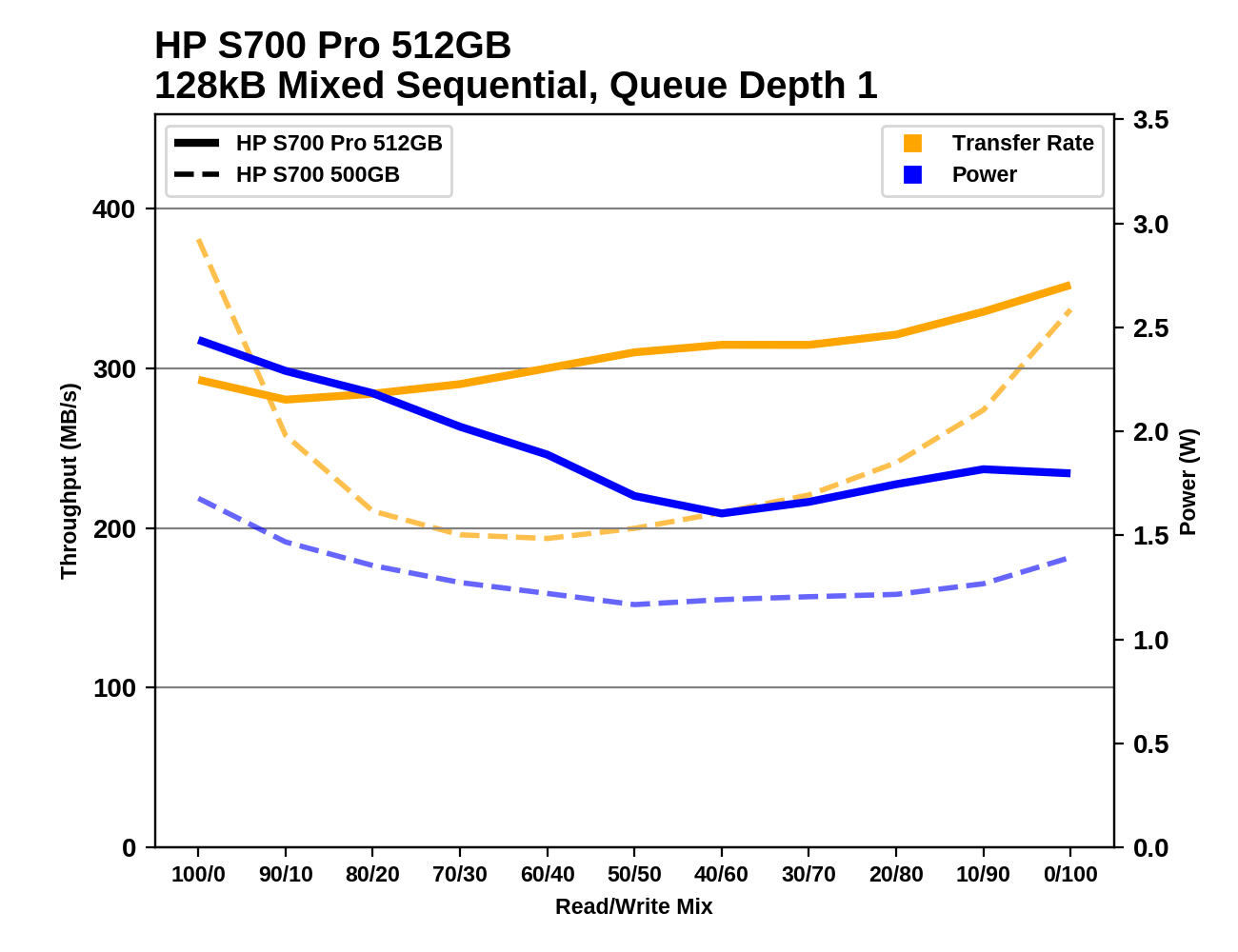 |
|||||||||
The larger two S700 Pros hardly lose any performance when writes are first introduced early in the test, and gradually speed up from there. The larger two S700s show a pronounced bathtub curve for performance, but they're fast enough at either end of the test that the overall performance is decent. The smallest two HP drives suffer from unsteady and low performance as they are performing garbage collection almost from the very beginning of the test.










54 Comments
View All Comments
ddriver - Thursday, September 7, 2017 - link
Why is it "Pro"? Performance - nope, endurance - nope, warranty - nope, sounds better - nailed it.HP's brand new Pro bested by Samsung's ancient Evo...
MajGenRelativity - Thursday, September 7, 2017 - link
It's better than the 700 non-Pro, so it warrants that in relation to its other counterpart.mooninite - Thursday, September 7, 2017 - link
You nailed it. Unfortunately HP will sell units because 1) they'll ship them in their own systems they sell and 2) they have blindly loyal customers.MajGenRelativity - Thursday, September 7, 2017 - link
I assume that's why HP went to the trouble of making an SSD? :Psyxbit - Thursday, September 7, 2017 - link
Making? They're not making anything here. They're repackaging another company's engineering efforts.Samus - Thursday, September 7, 2017 - link
The only blindly loyal customers out there are Lenovo's. On the whole, HP's mid-high end systems are the best on the market. Both companies...all companies, make crap at the low end. The business and professional market are where HP just destroys Lenovo is serviceability, reliability, and support. Lenovo simply wins on price. That's why people love them. Because they are cheap. And orange.sonny73n - Friday, September 8, 2017 - link
You sound spiteful. Are you hurt because Lenovo took over as the world's top ranking PC manufacturer after Q2 2013? HP has only gone downhill after that because all HP products have been made in China since who knows when.There's no company I dislike more than a domestic one with products being made overseas then shipped back and sold at home.
barleyguy - Friday, September 8, 2017 - link
You can't have your cake and eat it too. The reality is that western labor costs about 10 times as much as Chinese labor, and it's a price competitive market. If an HP laptop was built domestically, it would cost hundreds of dollars more, and most people would buy the cheaper one built in China.You either get cheap electronics or you get domestic manufacturing. At this point in time, you can't have both.
FunBunny2 - Friday, September 8, 2017 - link
-- The reality is that western labor costs about 10 times as much as Chinese laborthat made a bunch of difference years ago, but if you look at the FRED data, labor has become a vanishingly small part of production cost. if you're relying on bleeding labor to make money, you won't make much money.
Alexvrb - Sunday, September 10, 2017 - link
Exactly. Also there are lots of regions of the US where labor is cheap (rural low cost of living parts of RTW states for example). I suspect other factors such as taxes and regulation drive them to move production overseas more so than the hourly rate of workers.